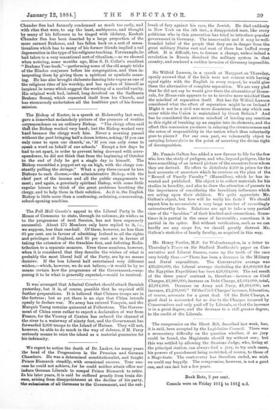The Bishop of Exeter, in a speech at Holsworthy last
week, gave a somewhat melancholy picture of the pressure of routine 'correspondence on an ordinary Bishop. "The clergy often said that the Bishop worked very hard; but the Bishop worked very hard because the clergy work him. Never a morning passed -without the post bringing half a dozen letters, asking,' If you can only come to open our church,' or, If you can only come to speak a word on behalf of our schools.' Except a few days he had to set apart, in order to prevent being drowned with corre- spondence, he did not think that from the beginning of October to the end of July he got a single day to himself. The Bishop resembled a puppet set up on high, with the clergy con- =stoutly pulling the strings." What a pity there cannot be two Bishops to each diocese,—the administrative Bishop, with the chief part of the income and all the public engagements to meet ; and again, a genuinely spiritual Bishop, with some little regular leisure to think of the great problems besetting the clergy, and to help them in their solution. As it is, the English Bishop is little more than a confirming, ordaining, consecrating, school-opening machine.






































 Previous page
Previous page